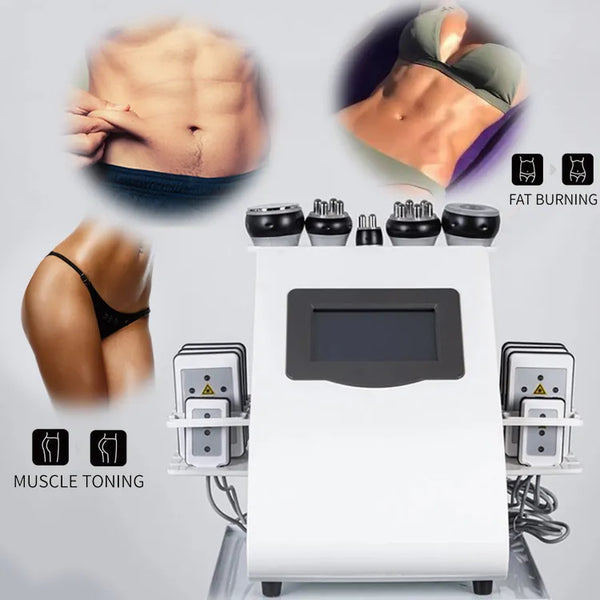In the continually evolving landscape of health and beauty, one technology that stands out for its promise of non-invasive enhancement is radio frequency (RF) cavitation. Popularly known for its body contouring and skin tightening effects, the use of RF cavitation has proliferated across spas, wellness centers, and clinics, garnering attention from beauty enthusiasts and health-conscious individuals alike. However, with this surge in popularity comes an equally intense concern for the safety of the procedure.
In this comprehensive examination, we'll address the important question on the minds of those considering RF cavitation: is it truly safe? We'll explore the scientific underpinnings of this technology, the safety precautions implemented in its execution, and provide clarity on common misconceptions. By the end, you'll be well-informed to make intelligent decisions about the treatments you choose.
The Science Behind Radio Frequency Cavitation
RF cavitation works by using high-frequency sound waves to create bubbles in the fat cells of the body. These bubbles implode, causing the breakdown of fat cells and their subsequent removal from the body through natural processes. This process is known as cavitation, hence the name radio frequency cavitation.
The technology behind RF cavitation has been around for decades and has a well-established safety profile. The sound waves used in the procedure fall within a safe range, similar to other medical imaging techniques such as ultrasound or MRI. Additionally, RF cavitation does not involve radiation, making it a safer alternative compared to other body contouring procedures like liposuction.
Safety Precautions in RF Cavitation
While RF cavitation is generally considered safe, there are some important precautions that must be taken during the procedure. First and foremost, it is crucial that the treatment is performed by a trained and certified professional. Improper use of the equipment or inexperienced handling can lead to serious injury.
It is also recommended to undergo a thorough consultation before starting any RF cavitation treatments. This allows for the identification of any underlying health conditions that may make you unsuitable for the treatment. Pregnant and breastfeeding women should not undergo RF cavitation, as well as individuals with certain medical conditions such as cancer or heart disease.
Common Misconceptions about RF Cavitation
There are several misconceptions surrounding RF cavitation that can often lead to confusion or hesitation in considering this treatment
Understanding Radio Frequency Cavitation
At its core, radio frequency cavitation is a cosmetic procedure that uses ultrasound technology to reduce localized fat cells. Unlike traditional liposuction, this method relies on sound waves to break down fat cells, which are then naturally flushed out of the body. The added benefit of RF technology is its ability to stimulate the production of collagen, resulting in tightened skin - a double action that's highly desirable in body sculpting.
How it Works
During an RF cavitation session, a practitioner uses a device that emits low-frequency sound waves. These waves create a pressure that turns fat cells into a liquid form, a process called "cavitation." Once the fat cells are liquified, the body's natural metabolic processes eliminate them.
Applications in Beauty
The applications for RF cavitation are broad, extending from cellulite reduction and body contouring to facial rejuvenation. The promise of a non-invasive alternative to surgical procedures has made it particularly popular for those seeking a more youthful appearance without the risks and downtime of surgical intervention.
Safety Measures in Radio Frequency Cavitation
Ensuring the safety of any cosmetic procedure is paramount, and RF cavitation is no exception. Centers and practitioners adhere to strict safety protocols to minimize any potential risks associated with the treatment. These include:
Medical History Assessment: Before undergoing RF cavitation, the practitioner will conduct a thorough assessment of the patient's medical history to identify any potential contraindications or risks.
Proper Training and Certification: Practitioners must undergo proper training and receive certification before performing RF cavitation procedures to ensure they understand how to operate the machines safely.
Proper Use of Equipment: It is essential to use the correct equipment and settings for each individual patient, as using incorrect settings can lead to adverse effects.
Protection Measures: Both the practitioner and the patient must wear protective gear, such as goggles and gloves, during the procedure to avoid any potential hazards.
Post-Treatment Care: After undergoing RF cavitation, it is crucial to follow post-treatment care instructions provided by the practitioner, such as drinking plenty of water and avoiding alcohol and caffeine, to aid in the body's natural detoxification process.
Conclusion
RF cavitation is a non-invasive cosmetic treatment that utilizes radio frequency energy to reduce fat cells in targeted areas of the body. It has gained popularity for its effectiveness in cellul
Standards and Protocols
All reputable establishments offering RF cavitation maintain a high standard of safety practices. These include obtaining a detailed history of the client's health, minimizing the intensity and duration of the treatment in line with individual tolerance levels, and providing aftercare guidance to reduce any discomfort or post-treatment effects.
Misconceptions and Risks
It's essential to distinguish between legitimate risks and common misconceptions when it comes to the safety of RF cavitation. For instance, while the treatment is generally safe, practitioners should be cautious with pregnant women, individuals with implantable devices, and those with certain medical conditions.
Expert Insights and Studies
The safety of RF cavitation has not escaped the scrutiny of researchers. Multiple studies have been conducted to assess both its effectiveness and potential risks.
Research Findings
Scientific studies, often peer-reviewed and published, can provide robust evidence of the safety profile of RF cavitation. These findings often serve as a basis for industry best practices and guidelines.
Professional Testimonials
Experts who work regularly with RF cavitation treatments offer a valuable real-world perspective. These testimonials can provide insights into the experience of incorporating RF cavitation into a wellness regimen or cosmetic practice.
Comparative Analysis
To put the safety of RF cavitation into clearer context, it's informative to compare and contrast with other similar treatments. This can include traditional liposuction or other non-invasive techniques like cryolipolysis (cool sculpting).
Contrasting Procedures
By examining how RF cavitation differs in execution and potential risks from other methods, consumers can build a more comprehensive understanding of their safety and efficacy.
Debunking Myths
With the proliferation of information, some myths and misconceptions about RF cavitation can cloud the judgment of those seeking such treatments. We tackle common myths to demystify the procedure and its safety.
Conclusion
Radio frequency cavitation, when performed by trained professionals with proper equipment, can be a safe and effective method for those looking to improve their appearance. Safety is integrated throughout the entire process, from initial client assessment to the delivery of each treatment and beyond. However, the onus is on both practitioners and clients to stay informed and ensure that this and any procedure is conducted with the highest regard for safety. By keeping an open line of communication and remaining vigilant, you can enjoy the benefits of RF cavitation with confidence.





